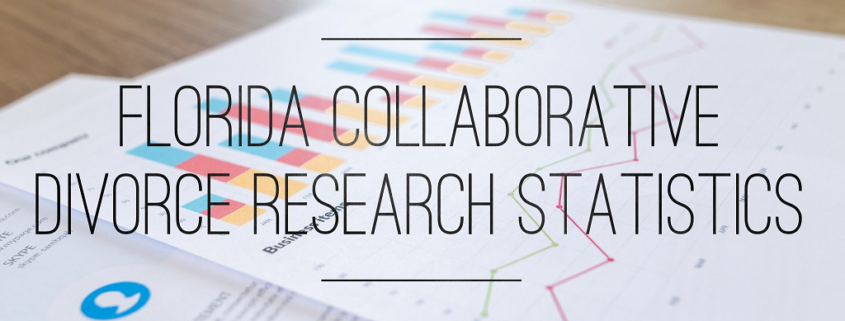Statistics on Collaborative Divorce in Florida (1/31/2018 Update)
In 2010, the International Academy of Collaborative Professionals (IACP) released the results of a 4 year study on Collaborative Practice. The results were based on information gathered from collaborative professionals who filled out a survey at the end of their case. The IACP Research Committee collected 933 surveys from throughout the United States and Canada, 97% of which were for divorce cases.
Remarkably, the IACP found that 86% of collaborative cases ended in a full resolution of all issues, while an additional 2% ended in reconciliation between the clients. Of those cases that terminated prior to a full agreement, 14% included a partial agreement between the clients, narrowing the issues that needed to be addressed.
In the aftermath of this research project, the IACP offered grants to local and statewide practice groups so that they could begin gathering data. The Florida Academy of Collaborative Professionals (FACP), an organization of over 500 independent collaborative professionals throughout the state of Florida, applied for IACP’s Gay Cox grant (named after a pioneer of the Collaborative Law Movement and proponent of research on the topic, who passed in 2013). The IACP approved the FACP’s grant request.
The results below are based on 101 responses, collected between December 16, 2013, and January 31, 2018. The authors note that data collection is ongoing, and encourage all professionals to complete and submit one survey at the end of each collaborative case. Surveys can be accessed and submitted via the member-only portal of the FACP website (http://collaborativepracticeflorida.com). For questions on the survey or accessing the members-only portal, professionals are encouraged to contact the authors.
76% of cases involved 1 mental health professional (serving in a role other than child specialist).
Additionally, 3 cases included two mental health professionals (serving in a role other than child specialist), and 6 cases involved a child specialist.
71% of cases included a financial specialist. The cases that included a financial specialist are broken down as follows:
- 87% utilized an accountant
- 11% utilized a financial planner
- 5 cases utilized both
Type of case:
- 93% of cases were divorce
- There were also the following responses:
- Paternity (1 case)
- Post Judgment (2 cases)
- Pre-Nuptial/Post-Nuptial (3 cases)
- Same Sex Separation (1 case) – Note, this survey was opened before same-sex marriage and same-sex divorce were widely recognized in Florida.
34% of cases included a “non-paid observer” (in some communities referred to as a “Collaborative Assistant”) for training or other purposes.
Practice Group – the following practice group had a member in the following number of cases:
- Next Generation Divorce (Tampa Bay/Greater Sarasota) – 39
- Tampa Bay Collaborative Divorce Group (Tampa) – 28
- Collaborative Family Law Institute (Miami) – 22
- Collaborative Family Law Group of Central Florida (Orlando) – 13
- Collaborative Family Law Professionals of South Florida – 8
- Collaborative Divorce Professionals of Gainesville – 6
- South Palm Beach Collaborative Law Group – 4
- Collaborative Lawyers of Southwest Florida (Ft. Myers) – 2
- Collaborative Family Law Group of Northeast Florida (Jacksonville) – 2
- Collaborative Divorce Lawyers Association of Palm Beach (Boca Raton) – 1
- Collaborative Divorce Team (West Palm Beach) – 2
Length of case (from signing of participation agreement to date full agreement was signed or case terminated):
- 31% of cases took less than 3 months
- 65% of cases took less than 6 months
- 84% of cases took less than 9 months
- 5% of cases took more than 12 months
Outcome:
- 92% of cases completed with a full settlement agreement
11 cases were full pro bono cases (all professionals pro bono)
On average, professionals put the following number of hours in each case:
- Attorneys – 51 hours (an extreme outlier, 13,052 hours, was excluded from this average as it was more then 10,000 hours different than any other answer, including any other answer in the filled out form, and was likely an error)
- Mental Health Professional – 29 hours
- Financial Professional – 54 hours
Cost – Of non-pro bono cases:
- 53% had a total cost of $20,000 or less per client
- Very Easy or Easy vs. Moderate vs. Difficult or Very Difficult
- Of Very Easy or Easy cases, 54% cost $7,500 or less per client
- Of Moderate cases, 53 cost $15,000 or less per client
- Of Difficult or Very Difficult cases, 62% cost $37,500 or less per client
Difficulty of non-pro bono cases:
- 44% of cases were Difficult or Very Difficult
- 39% were Moderate
- 17% were Easy or Very Easy
The following factors regarding the clients were most cited to cause the case to be difficult or terminate:
- Lack of trust between the clients (51%)
- Imbalance of power between the clients (43%)
- One or both clients had a mental health issue (32%)
- One or both clients’ expectations about the process were unrealistic (28%)
- One or both clients’ expectations about outcome were unrealistic (25%)
- One or both clients had an extreme lack of empathy for the other client (20%)
- One or both clients acted unilaterally (20%)
The following substantive issues were most likely to cause the case to be difficult or terminate:
- Spousal maintenance (38%)
- Division of assets (32%)
- Parenting time (18%)
- Determination of non-marital or separate property (18%)
82% of cases involved children
Racial makeup of clients:
- 81% were Caucasian
- 10% were Hispanic
- 4% were Black or African American
- 2% were Asian
- 5% were Other
56% of clients earned a gross annual income of $74,999 or less
52% of families had a net marital estate value of $750,000 or less
FACP Research Committee Co-Chairs
A version of this article originally appeared on the website of the Florida Academy of Collaborative Professionals.





